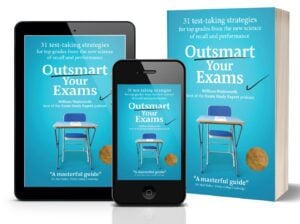Is AP US History easy or hard? We reveal the APUSH difficulty rating, based on a unique combination of 2023 pass rate data, and 3,160 class reviews from real AP alumnae collected by r/APStudents.
Is AP US History Easy Or Hard?
AP US History (APUSH) is considered quite hard, with class alumnae rating it 6.0/10 for overall difficulty (the 11th-most-difficult out of the 28 large AP classes surveyed).
The pass rate is much lower than other AP classes, with 48% graduating with a 3 or higher.
AP US History is extremely widely-taken (473,000 entries last year), and 92% would recommend the class.
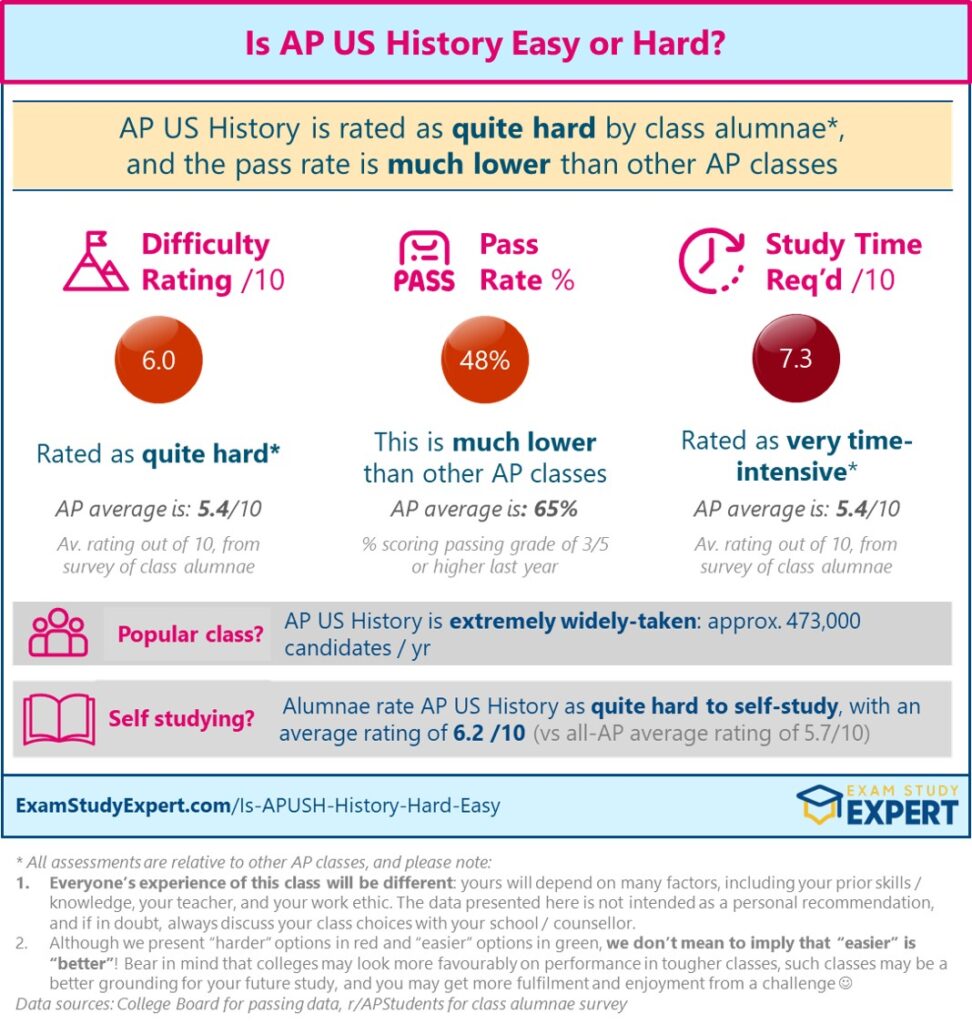
Although APUSH is considered moderately difficult, alumnae reviewers had differing opinions on the difficulty, enjoyed their experiences of the class, and found it manageable with a strong understanding of the underlying concepts and causation between different periods of US History.
You can see how APUSH compares to other classes for difficulty in the below chart:
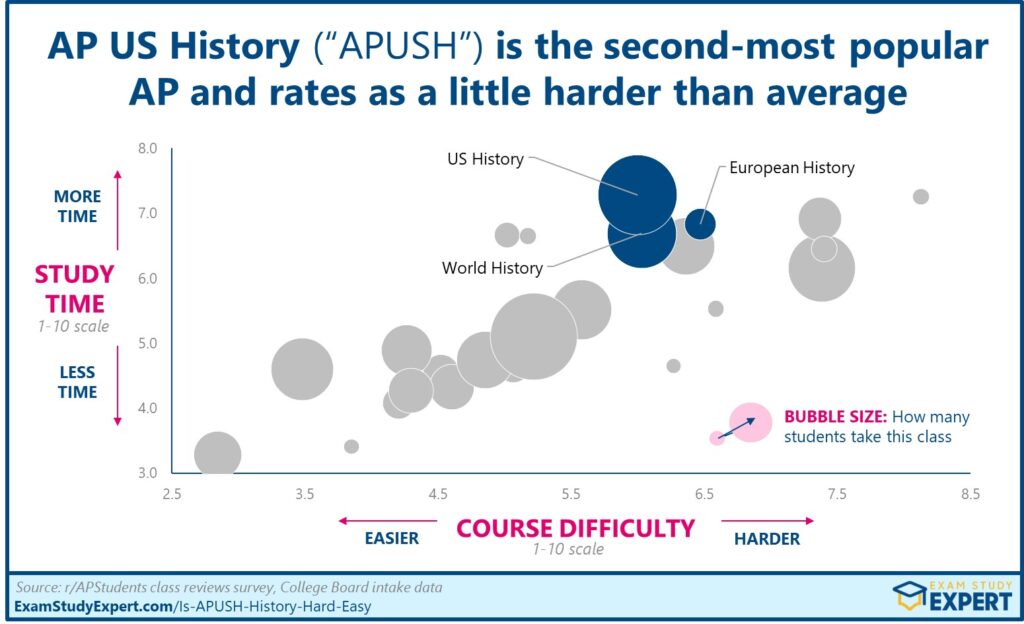
We’ve highlighted AP US History and related history classes (World History and European History) only – to see the full version of this chart, check out our article ranking ALL the AP classes from easy to hard.
You can read more about AP World History and AP European History here.
How Difficult Is AP US History – As Rated By Class Alumnae
APUSH is considered quite hard, with class alumnae rating it 6.0/10 for overall difficulty, making it the 11th-most-difficult out of the 28 large AP classes surveyed.
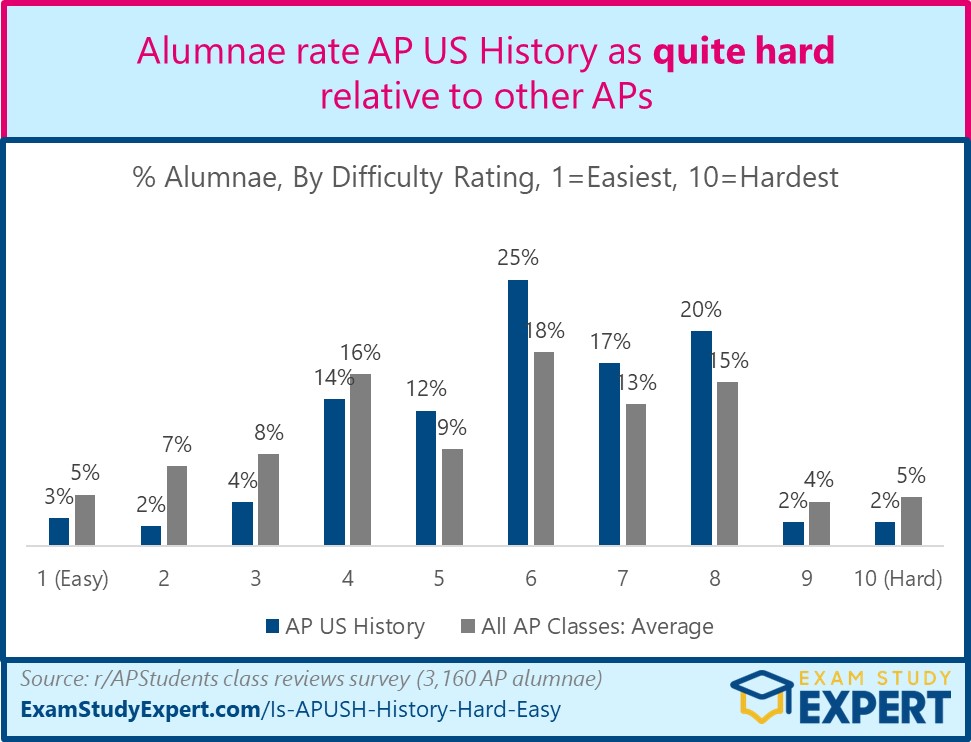
What Is the APUSH Pass Rate 2023?
AP US History 2023 pass rate 48%, much lower than the all-AP-class average of 66%.
The highest percentage of candidates received a 1 (29%), almost double the all-AP average. The percentage of candidates who passed with a 3, 4 or 5 were each 5-7% below the all-AP average.
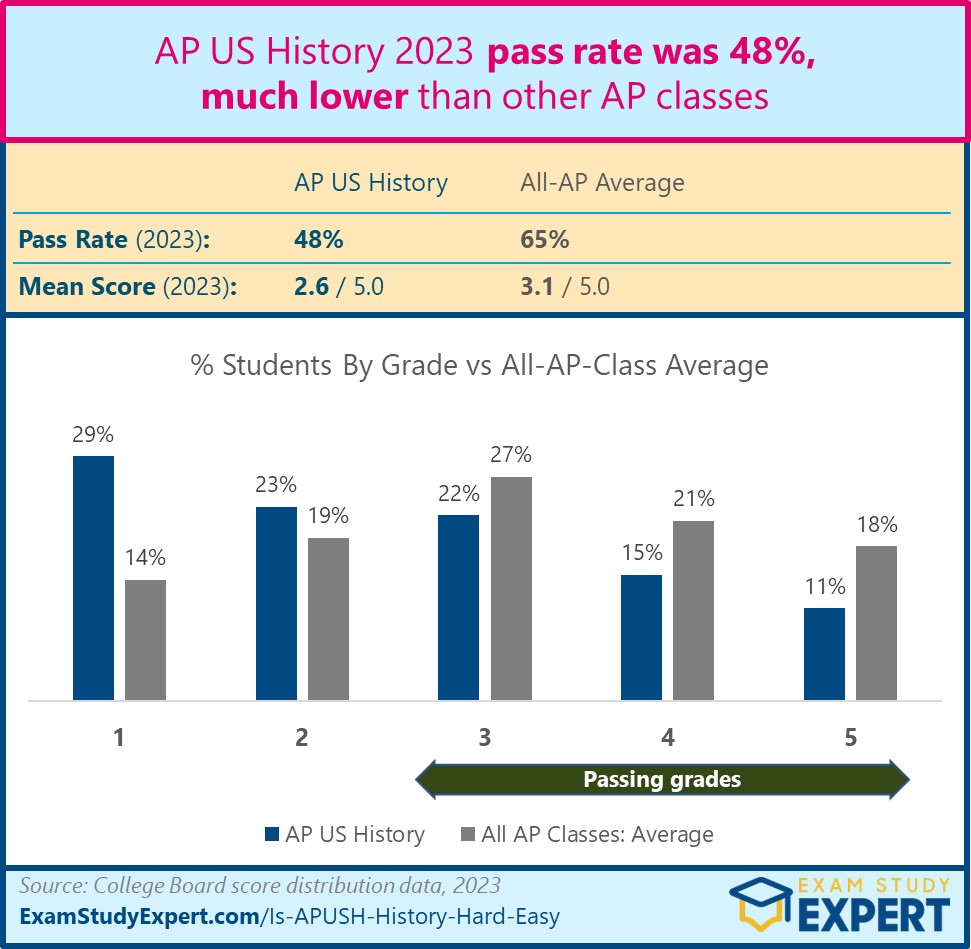
APUSH Pass Rate / Score Distribution Over Time: 2023, 2022, 2021 …
The APUSH score distribution has had some variation over the past 5 years. Most notably, in 2020 the pass rate rose to 59%, before falling 11% to its lowest point (48%) in 2021. It remained at this low rate in 2022 and 2023.
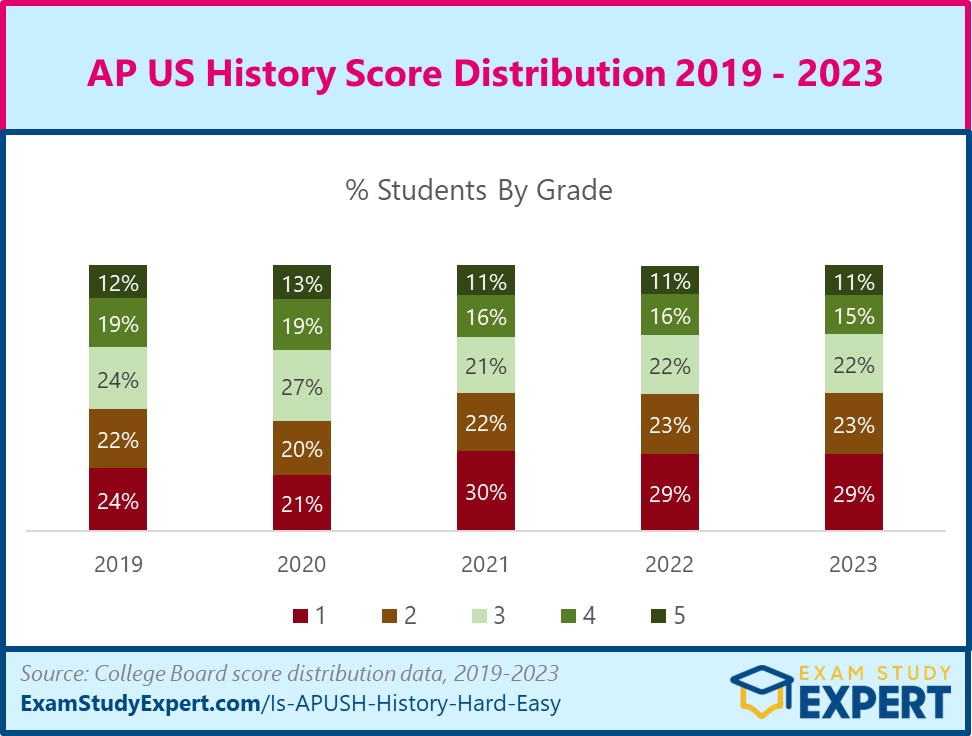
Is AP US History Time Consuming To Study: As Rated By Alumnae
APUSH is rated as very time-intensive relative to other AP classes.
A survey of AP alumnae asked for a rating out of 10 for time needed to study each class, with 1 = least time needed, 10 = most time. The average rating for AP US History was 7.3/10 (vs the average across all AP classes of 5.4/10).
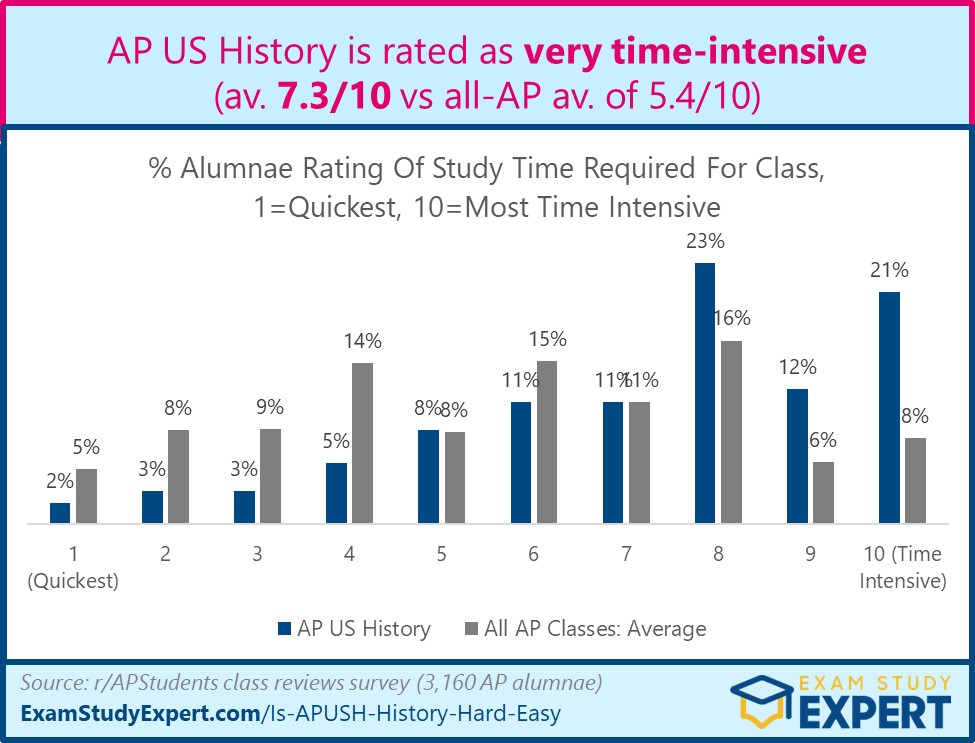
Is APUSH Easy or Hard To Self-Study
AP US History is rated as quite hard to self-study relative to other AP classes.
A survey of AP alumnae asked for a rating out of 10 for how easy each class is to self study, with 1 = easiest to self study, 10 = hardest to self study. The average rating for APUSH was 6.2/10 (vs the average across all AP classes of 5.7/10).

How Hard Is APUSH: 212 Real Alumnae Share Their Experiences
If you’re looking forward to taking APUSH, it’s important to take both the positive and negative feedback in context. There are multiple factors that could contribute to a great or poor experience of the class, such as your teacher and your personal preferences as a learner.
An impressive 92% of APUSH alumnae would recommend the class.
The majority of the reviews focus on course experience, the importance of overall concepts and different topics, the need for steady preparation, and helpful study methods.
1. Students have a lot to say about their experiences of APUSH, some positive …
“I LOVED this class!! Recommend it to everyone! APUSH is 100% worth it if you like history even vaguely. If you don’t mind reading it’s not bad. The work is just time consuming, not hard. Then all you have to do is learn the writing style.” – Score: 5
“This was my first AP class so mastering the essays was a little difficult. In spite of this, the general familiarity most students have with US History makes the test self studyable if one puts in the review time.” – AP US History Score: 5
“Learning history is fun, so go for the details.” – Score: 4
2. … and some less positive
“Definitely my most time consuming class. I had to read the textbook every night and ended up reading the entire thing as part of my homework over the course of the year. I don’t really know how I pulled a 5 but study for the DBQ since you don’t need to know stuff and can get easy points if you study the format.” – Score: 5
“Genuinely don’t think it’s that impossible to get a 5 but I slacked my ass off this year. Harder than World and you will need to put in the work to study, and I think no matter what school you go to, teachers will demand a lot of workload.” – Score: 4
“APUSH is a pretty time consuming class. You need to be at-it frequently re-studying your history so when exam time comes it isn’t an overload of stuff to review.” – Score: 5
“The class itself is interesting but the workload destroys the experience. The amount of time it takes to get an A in this class parallels that of three AP classes combined. If you like history or are going into a related major, take this class. Otherwise, you’re better off taking a different AP (or a non-AP, of course) and saving yourself the time.” – Score: 4
“If you are not good with history, obviously going to need to put work into this class. Be prepared to write, and with hard work it’s doable. AMSCO book is 10/10.” – Score: 5
“You’ll have to pull all nighters a lot.” – Score: 5
3. Opinions on class difficulty varied a lot
“I would say that APUSH is not hard, it’s just a lot of work.” – Score: 5
“This is a hard class, but rewarding if you can find the patterns in history; take it if you know the teacher is good” – Score: 4
“This was one of the easiest AP classes. … STUDY ALL OF THE TIME PERIODS!!!!” – Score: 5
“Self studied bc we had no teacher until February! Very difficult but I pulled through with a three. Just take in as much info as possible and try to memorize important events much as possible.” – Score: 3
“The class is not that hard, but it is at times just dates and specifics memorization. But if you know the general time periods in which things occur you won’t be far behind” – Score: 4
“This is a hard course. I didn’t read the textbook and it came back to bite me in the ass whenever we had a test in class. … On top of that, expect it to tank your grade a bit if you aren’t 100% on top of things.” – Score: 4
“Not a very difficult AP class, as long as you stay diligent on readings from your textbook. Our teacher gave us practice FRQs and multiple choice type questions every few weeks, which were great for helping us prepare for the format of the AP exam.” – Score: 4
“Boring class, medium hard tests, ridiculously difficult MC on the AP exam” – Score: 2
“Again, your class may require you to take detailed notes. I self studied it. Relatively easy.” – Score: 5
4. Knowing the format of the AP US History exam is crucial
“Understand how to interpret FRQ questions and whether they’re asking for CCOT, Causation, etc. I would spend roughly 2-3 hours a night with my notes.” – Score: 5
“SAQ: usually there are big events and big concepts on one question, so kind of go over them and their cause – effects, cartoons and posters need some practice; FRQ: DBQ just needs practice, if you do them in school that’s good enough; LEQ think about overall flow chart esque stream of changes over a certain period in a certain theme. ap course outline helps.” – Score: 5
“Practice your free responses a lot. Know the rubrics for those inside and out. It’s a matter of memorization, and memorization of a lot depending on your teacher, so be ready to buckle down, get disciplined, and have a blast.” – Score: 5
“Do practice short answers/DBQs/LEQs, one of the practice questions I did was literally in the same style as one of the short answers. Overall, the class was super fun but a lot of hard work.” – Score: 5
“The essays are formulaic recall forms basically, if you follow their outline you’ll get close to max score no matter your writing skill.” – Score: 5
“Mastering the DBQ and memorization is what will get you the best scores” – Score: 4
“’Like the other history APs, success on the APUSH exam is 50% memorization and mastery of the content and 50% understanding the rubrics and scoring criteria.” – Score: 5
5. Focusing on the overall concepts and big picture is important for success …
“Focus more on why an event happened and what other events it caused than specific details. They focus a lot on the big picture.” – Score: 5
“Study, pay attention to the course material, focus a lot on economic and social changes, less on the military periods. Try to enjoy yourself, and find interesting points in US history.” – Score: 5
“Focus on the events and what causes them and the effects that came afterwards. Especially when it comes to the society, culture, economy, politics, and ideas of the US.” – Score: 3
“Take very very close note at continuities and changes in American history through all respects. Note how culture, politics, economics, and international reations continue or change and analyze what each necessary fact means to the greater whole of American history. Pay attention to the why and when factors when you discuss an event.” – Score: 4
“You should be learning the concepts all year and the big ideas (Manifest destiny, slavery use throughout the colonies are two big themes of APUSH). Don’t forget to study more recent US history either- that’s notorious for showing up on the test despite less class time to learn it.” – Score: 4
“Memorize the general trends and events of each time period (and apply that knowledge to stuff you don’t know) and you are guaranteed a 4+” – Score: 5
“Background knowledge of American history helps” – Score: 5
6. … and there are lots of topics alumnae felt were important
“Study everything. On my AP exam they mentioned WW II exactly once and had 10 questions on early spanish and french settlers.” – Score: 5
“Make sure to not only study the general info and facts of the course, but to also understand how those events connect to each other (Bacon’s Rebellion led to the widespread implementation of slavery; discrimination against the Irish in the 1800s is similar to the nativism and increased racism in the 1920s; etc). Also, carefully read the MC and SAQ questions; a lot of the time, you will overthink them if you do not.” – Score: 4
“Study feminism, immigration, Civil Rights, Slavery, Progressivism, and American Independence in depth, you are guaranteed to have a FRQ and/or Short Answer on it.” – Score: 4
“Concentrate on general themes of each of the 9 eras, in terms of mainly political timelines. Don’t forget to focus in each era on how the U.S’s role in the world changed and how it’s economy transformed to suit the world market. Focus on era themes and connect specific ideas to certain people or groups.” – Score: 5
“If you don’t have much time, focus only on 1754-1787, 1820-1865, and 1914-present. The bulk of the content revolves around Revolutionary, Civil, and World Wars. There are some things in there about Jefferson and Adams and other more minor things, and smaller wars and Natives Americans and other shit but that’d take way too long. If you wanna quick pass, just study those 3 big time periods. Forget about 1350-1750.” – Score: 5
What Does It Take To Succeed: How To Study For The APUSH Exam
What is AP US History? Course Outline & Requirements
According to College Board:
“In AP U.S. History, students investigate significant events, individuals, developments, and processes from approximately 1491 to the present. Students develop and use the same skills and methods employed by historians.”
There are no prerequisites for APUSH. Students are expected to read college-level textbooks.
You will develop skills in:
- Identifying and explaining historical concepts, sources and situations
- Comparing and explaining primary and secondary source evidence and arguments
- Contextualizing and making connections between historical developments and processes
- Constructing, corroborating and supporting evidence-based historical arguments
- Using reasoning about comparison, causation, continuity and change
The exam consists of one 3 hour 15 minute exam, in three sections. Section 1 consists of 40% (55 minutes) of multiple-choice questions (MCQs); Section 2 is 20% (40 minutes) with 3 short answer questions; and Section 3 is 40% (1 hour 40 minutes) for 2 free-response questions (25% document-based and 15% long essay).
For more details, see: College Board’s AP US History course page.
Examiners’ Reviews: Takeaways From AP US History Test Assessors
College Board released the following official comments about the 2021 exam results:
Multiple-choice section
- “As usual, students scored significantly higher on the multiple-choice section than on the free-response questions.”
- “AP U.S. History students’ mastery of Period 6 (1865–1898) is incredible. 34% of students achieved perfect scores on this period, the highest multiple-choice performance I’ve seen in any subject so far this year.”
- Students scored lowest, overall, on questions about Period 7 (1890–1945), with 9% of students earning perfect scores on this period.”
- “Students scored impressively high on multiple-choice questions related to the skill of contextualization; 41% of students answered most or all of such questions correctly.”
- “The most challenging skill for students in the multiple-choice section was Skill 5: Making Connections, which involves identifying patterns of causation, continuity, and change. 15% of students answered most or all of such questions correctly.”
Free-response section
- “The highest performance in the free-response section was on Short Answer Question #2 about women and the World War II. 21% of AP U.S. History students achieved perfect scores as they charted developments in women’s history from 1900–1941 and from 1944–1970.”
- “The lowest performance within this year’s AP U.S. History Exam was among the students who chose Short Answer Question #3 about American Indian relations with the United States from 1776–1815 and 1815–1848. 3% of students who chose this question earned perfect scores on it and 29% received 0 points.”
- “The most popular long essay topic was “Trans-Atlantic voyages from 1491–1607,” chosen by 51% of students; students who chose this topic collectively earned a higher average score on it than students who chose either of the other 2 topics. 74% of these students earned the thesis point.”
- “The second most popular topic was “international conflicts from 1898–1830,” chosen by 39% of students. 63% of these students earned the thesis point.”
- “Relatively few students (10%) chose “reform activity from 1800–1848,” and many of those who did struggled to provide historical evidence or to generate a thesis. 49% of these students earned the thesis point.”
For best results, you may therefore want to consider investing a little extra study time on Period 7 (1890–1945), Skill 5 (“Making Connections”) and American-Indian relations in the US.
For more details, see: College Board’s AP US History 2021 exam results page.
How To (Self) Study APUSH: Advice From Class Alumnae
APUSH success often comes down to the study methods you pick – choose wisely!
“Taking practice tests was very helpful (as it is in any ap course) because I could actually hone my skills for specific requirements on each free response type. Also, making flashcards for the things I wasn’t immediately familiar with in each period was very helpful, but time consuming … Looking through various forms of studying is the most important thing (ex. youtube videos, practice tests, flashcards, reading textbook, listening to textbook…)” – Score: 5
“- Take good notes that you can review later! – Practice mock exams from Collegeboard or other online places. – Don’t be afraid to ask for help if you don’t understand something. – Going along with the third point; DON’T CRAM LAST MINUTE! I know someone who did and it didn’t go well for them.” – Score: 5
“’Read and Reread the AMSCO. It has everything you need for the exam in it. Also, I made a giant table with each time period on one axis, and each theme on the other axis, and filled it in with evidence to use during the LEQ/DBQ, and that was really helpful.” – Score: 5
“Make sure to start studying 2 months before the exam, at least 1hr a day. Know the overall picture, but it is better to know the specific dates of most events in each period. Print out FRQs from past years’ tests and write DBQs and etc, around the month before, you should be practicing writing.” – Score: 5
“READ THE TEXTBOOK. Make sure you are taking notes and reviewing along the way as it is a nightmare to try to cram study. Be able to identify important people, places, and events for every decade.” – Score: 5
Doing well in APUSH requires dedicated study (all year)
“Start practicing writing thesis statements and short answers VERY early on. Also, for the test, focusing on the DBQ and spending more time on that while only starting an introductory paragraph and counterargument for the LEQ can help you get a stronger score. The DBQ weighs more in score than the LEQ and often, it’s just a matter of cramming in as many documents as possible.” – Score: 5
“You should pay attention all year in class and do not study last minute for the exam.” – Score: 4
“Try to review first semester material during winter break. Also, a few days before the exam, maybe a week before max (so that you remember it all), watch all of Adam Norris’s playlists on the 9 periods. That legit is the reason I got a 5.” – Score: 5
“Make sure to keep up with reading your textbook. That allows you to be very engaged and take good notes during lectures. And learn how to write a dbq, it killed my chances of a 5.” – Score: 4
“Be sure to practice writing the responses well it’ll help, also don’t leave studying to the last minute you need to really go over all the information.” – Score: 4
“Study a bit every week and don’t lose your notes. Practice writing essays if you can and know what each party stood for in each time period” – Score: 5
“My APUSH teacher basically had us doing notes on the weekend and exam prep (DBQ, Multiple Choice, LEQ, etc.) or discussion on the week’s notes (via Socratic Seminar) in class, with a lecture once in a while.” – Score: 5
There are some great test prep resources available
“Look for summaries of chapters from your text book. Use online text book resources. When reading summarize each text on a stickie note.” – Score: 4
“If you want to make sure you get a 5, read the textbook and take detailed notes on whatever lectures you may have. Jocz Productions and Adam Norris are amazing resources on YouTube.” – Score: 5
“I didn’t use AMSCO and REA until about a month before the exam. AMSCO was a bit too much for a short review, so I would recommend it for someone who is self-studying (it’s 700 pages). REA was a really helpful refresher, it’s quick and concise and covers all of the topics on the exam from what I know.” – Score: 4
“Personally, I found AMSCO and The American Pageant to be very dense, so I used the chapter summaries on APNotes.net to make timelines and define the significance of key terms and events. Before unit tests, I read the corresponding chapter of PR the week before, and I reread all of it the month before the AP exam. I also read the REA Crash Course book the night before and morning of.” – Score: 5
“With this course, it’s crucial to read your textbook. Don’t skim it, study it and understand the content. I also cannot recommend the YouTube channel Adam Norris enough as a supplement to your class.” – Score: 5
“I just watched and took notes on all the jocz chapter review videos, only read the princeton review once and mostly just used it for the practice exams, do A LOT A LOT OF DBQ/LEQ/SAQ practice” – Score: 5
Best books and test prep resources for AP US History
The most popular textbook for test prep and review for APUSH is Princeton Review, used by 45% of students. It has an average rating of 4.7/5.0 from reviewers on Amazon.com.
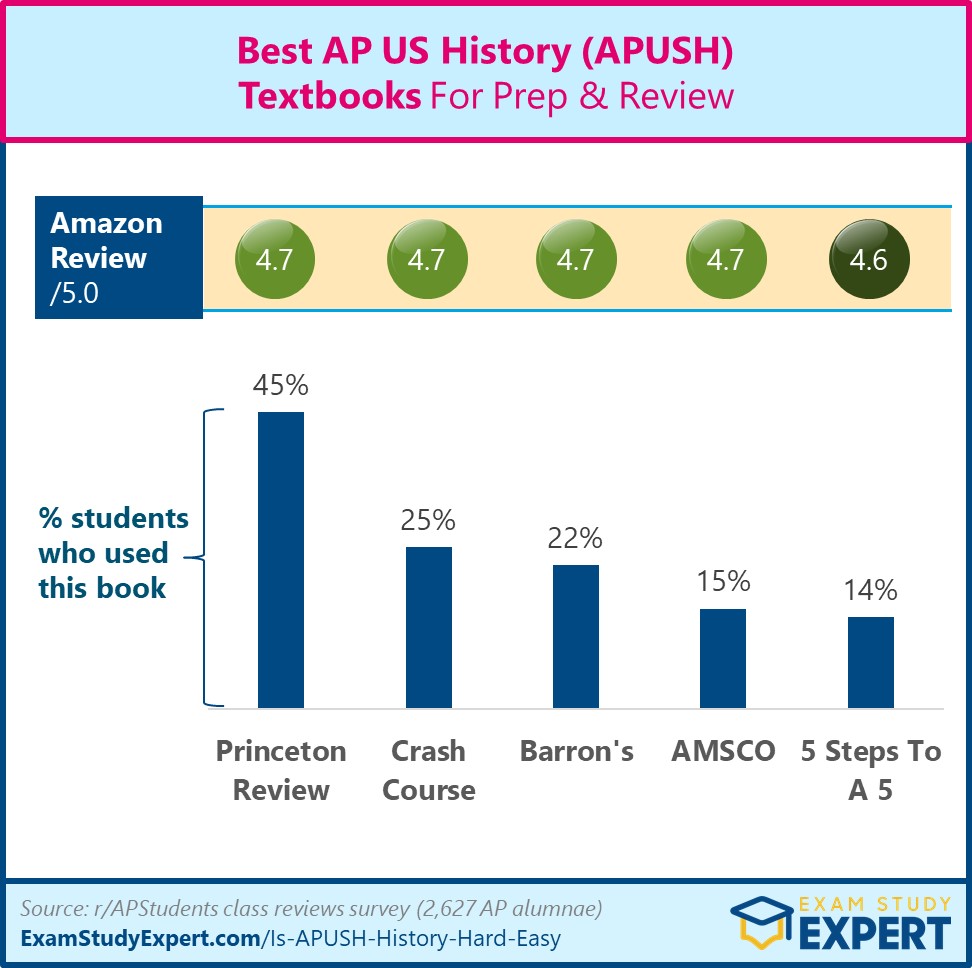
Other popular APUSH test prep / review books and resources for include:
Where next?
Find out how APUSH compares to other classes: click here for an overview of all AP Classes ranked by difficulty, from easiest to hardest.
Or check out how other history courses are rated with our analyses of AP World History and AP European History.
Wishing you every success in the class!
- [2024] Are AP US Government & Politics and AP Comparative Government and Politics Hard or Easy? Difficulty Rated ‘Quite Easy’ (Real Student Reviews + Pass Data) - 5 Jan 2024
- [2024] Is AP Human Geography Hard or Easy? Difficulty Rated ‘Quite Easy’ (Real Student Reviews + Pass Data) - 5 Jan 2024
- [2024] Is AP Microeconomics Hard or Easy? Difficulty Rated ‘Quite Easy’ (Real Student Reviews + Pass Data) - 5 Jan 2024

